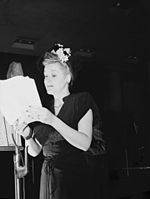No subscription or hidden extras
Read through all quotes from Margaret Whiting
Margaret Eleanor Whiting (July 22 1924 – January 10 2011) was a singer of American popular music and country music who first made her reputation during the 1940s and 1950s. In 1942 Mercer co-founded Capitol Records and signed Margaret to one of Capitol's first recording contracts. Recording career
Whiting's first recordings were as featured singer with various orchestras:
"That Old Black Magic" with Freddie Slack and His Orchestra (1942)
"Moonlight in Vermont" with Billy Butterfield's Orchestra (1943)
"It Might as Well Be Spring" with Paul Weston and His Orchestra (1945)
In 1945 Whiting began to record under her own name making such recordings as:
"All Through the Day" (1945 becoming a bestseller in the spring of 1946)
"In Love in Vain" (1945)
(these two from the movie "Centennial Summer")
"Guilty" (1946)
"Oh But I Do" (1946)
"A Tree in the Meadow" (a number 1 hit in the summer of 1948)
"Slippin' Around" a duet with country music star Jimmy Wakely (a number 1 hit in 1949)
"Baby It's Cold Outside" (duet with Johnny Mercer 1949)
"Blind Date" a novelty record with Bob Hope (1950)
"Faraway Places (With Strange Sounding Names)"
"Silver Bells" (duet with Jimmy Wakely 1951)
Until the mid-1950s Whiting continued to record for Capitol but as Margaret Whiting ceased to record songs that charted as hits Margaret Whiting switched to Dot Records in 1957 and to Verve Records in 1960.

